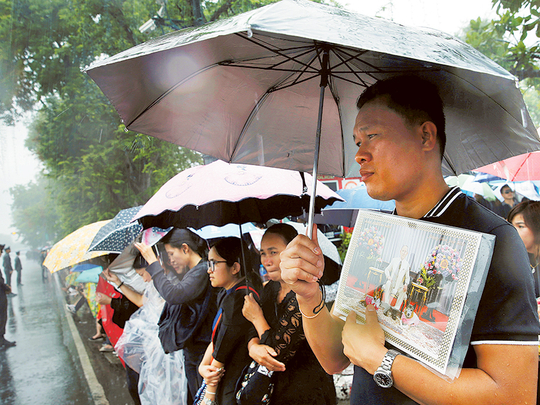
Bangkok: Almost on the stroke of midday, the skies above this city opened, drenching its streets and mourning residents. Ironically, too, Sunday officially marked the end of Vassa, the three-month rainy period that devout Thais consider to be their Buddhist Lent.
Choonbun Rimkimphat was doing a brisk trade selling stupa, traditional gold ornaments that adorn shrines. His are injection-moulded and imported from Myanmar.
“These past three days have been very busy,” Rimkimphat said. “So many customers. Everyone wants to build a shrine for his majesty.”
King Bhumibol Adulyadej, 88, died on Thursday after seven decades ruling this nation of 67 million. For most Thais, he is the only monarch they have ever known, a figure of political stability and political reverence. He ascended the throne in 1946 after his elder brother, King Ananda Mahidol, died in a shooting incident, and has survived a dozen military coups.
In front of every public building, and many businesses, temporary street-side shrines have been erected, all featuring a portrait of King Bhumibol; two stupa; yellow ribbons to honour the Royal Family; and black and white ribbons for mourning.
The military government, led by former general and Prime Minister Prayuth Chan-ocha, has ordered an official mourning period of one year, and entertainment and festivals have been cancelled for at least 15 days.
Sunday, bars, restaurants and corner stores were prohibited from selling alcohol. Vendors like Rimkimphat and those selling clothes and ribbons have been warned by authorities not to inflate prices nor try to profit during the mourning period.
As the heavy rain eased to a drizzle, Roong Chayya helped her 78-year-old mother, Ana, to a temple site to burn incense and offer prayers for King Bhumibol.
“He was our father,” Chayya said. “He symbolised everything that was good. He helped the people of Thailand so much. We knew this day would come we never wanted it to happen. We all loved him so much.” Her mother nodded knowingly at the sentiments, even if she didn’t understand the actual English spoken.
“We wish all the best for our new majesty,” Chayya added.
For many expats who have made Thailand home, the current transition period has brought a level of uncertainty.
“It’s a time of great change,” Tim Edwards, a retired British national who has made Bangkok his home, along with a new Thai wife, said.
“There is such a grace to Thai people. You see it in the way they greet you, showing respect,” Edwards said. “Since the king died, you can really set a sense of loss. My wife is inconsolable right now, and it’s the same for her friends and family. King Bhumibol was really loved and adored, and his death feels as if a close member of the family has just died.”
For Edward’s buddies who used to regularly gather at The Penalty Spot to watch English Premier League football games, the mourning period means television screens are now showing moments from King Bhumibol’s life and seven decades on the throne.
The more raucous and hedonistic venues are equally subdued, and garish neon lights have been switched off.
“Taxi number three, tuk-tuk number two, motorbike number one,” JoJo, a motorbike taxi driver tells Gulf News as he wove between traffic on the slick city streets.
“JoJo driver number 1,” he says as he mounts the footpath and dodges pedestrians to bypass some vehicles. He slams on his brakes, coming to a stop centimetres before hitting a tuk-tuk, and mutters what is undoubtedly a Thai expletive.
Many of the city’s tuk-tuks usually sport light and sound systems to attract revellers. Now, those have been unplugged or disconnected, and that means brake and rear lights don’t work either.
“No worry,” he says. “JoJo driver number 1.”
At this rate, there’ll soon be a mourning period for him.












